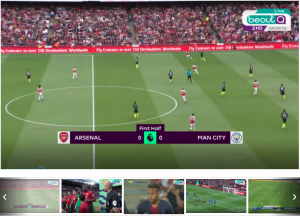
After more than 40 years of operation, DTVE is closing its doors and our website will no longer be updated daily. Thank you for all of your support.
Middle East media: new recruits for BeIN’s battle
 The BBC and Sky this week added their voices to the growing chorus of media organisations calling for action on BeoutQ, the high-profile piracy operation allegedly backed by Saudi Arabia as part of its campaign against neighbouring Qatar.
The BBC and Sky this week added their voices to the growing chorus of media organisations calling for action on BeoutQ, the high-profile piracy operation allegedly backed by Saudi Arabia as part of its campaign against neighbouring Qatar.
The BBC and Sky called on the European Commission to take action against Saudi Arabia by petitioning the EU commissioner on trade, Anna Malmström.
The two media heavyweights’ concern highlights just how significant a threat BeoutQ has become to media groups outside the region, undermining their ability to effectively license their content. BeoutQ’s pirate activity has spilled out of the Middle East and is having an impact in Europe itself.
The BBC and Sky are adding their weight to a call for action that has already attracted the support of the English Premier League, one of the principal victims of BeoutQ’s piracy, the French football league, and Formula 1.
BeIN Media has meanwhile launched an international investment arbitration action against the Kingdom, claiming damages to the tune of US$1 billion, not only because of the impact of BeoutQ’s piracy but because of the Saudi authorities’ wider campaign against its commercial interests.
The relentless targeting of BeIN Media by such a provocatively branded service clearly suggests that BeoutQ’s assault is politically motivated, with the loss of earnings to western media outfits likely to be seen as acceptable collateral damage – particularly if they do deals with BeIN Media.
The background to the battle between BeoutQ and BeIN Media encompasses more than the Saudi-led boycott of Qatar, however. Saudi Arabia has over the past year or so been highly active in developing its own media interests. The Kingdom, or members of the Saudi royal family, are believed to be the owners of the Dubai-based leading pan-Arab broadcaster MBC, which earlier this year unveiled plans to shift more of its focus towards Saudi Arabia in line with the “current transformational positive changes” taking place in the Kingdom under the leadership of the controversial Crown Prince Mohammed bin Salman, including growth in premium content production.
MBC recently established an MBC Studios arm, based on existing assets, to provide content for Saudi as well as international audiences.
Saudi Telecom (STC) meanwhile has launched, via IP video technology outfit Intigral, its own Middle East –focused OTT TV video platform, Jawwy TV. Made available in multiple countries across the region from the spring, it also signed up OTT TV provider Starz Play to make its content available via the Jawwy TV box and on multiple screens via the Jawwy app.
All of this suggests that Saudi Arabia may have an ambition to create its own pay TV and OTT platform that can rival and surpass BeIN Media which, despite the boycott and attempts to restrict its activities not only in Saudi Arabia but elsewhere in the region, remains popular with many Saudis.
BeoutQ meanwhile is an extreme manifestation of the challenges that have long bedeviled the development of pay TV in the region. The prevalence of piracy in all its forms, down to the illicit distribution of signals in housing complexes, something that is understood to be common in Saudi Arabia, contributes to the high licensing costs that legitimate players must bear, which in turn contribute to the high cost of legitimate services that fuels piracy.
Despite the challenges facing premium video players in the region, the Middle East has seen the launch of multiple streaming services including Netflix and Iflix that complement and compete with existing pay TV providers. There is also a growing interest in local content, the development of which has taken a long time to come to gestation. BBC Studios recently established a partnership with BeIN to develop production as well as distribution of content in Qatar, while Netflix this year announced its first Arabic original, Jinn. just two examples of initiatives that are spouting up to foster local talent.
All of these developments and issues, and the likely future direction of Middle East media, will be discussed in more detail in DTVE’s forthcoming MEA 2018 special issue.


